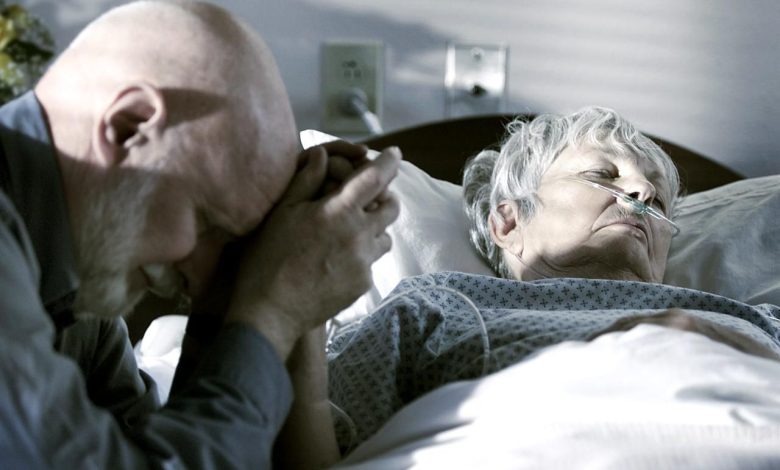What are the signs of death in hospice?

The final moments and hours of life can be filled with significance and gestures of affection. This is also a moment of physical and mental upheaval and transition, and no two people experience death similarly.
MelodiaCare is available to assist the entire family during this challenging time. Consider the following questions during this potentially distressing period, when the goal is to ensure the patient’s comfort.
What physical changes should I anticipate?
Sleeping
As the body alters how it uses energy, a person nearing death may cease speaking or responding and begin to sleep more and more. Assume that your loved one can hear at all times, even if unconscious, and is no longer communicating. Continue speaking with your loved ones and touch them if it comforts them.
Loss of desire for food and drink
As the body shuts down, it loses the ability to digest food and fluids. Therefore, the individual may have little desire to eat or drink. The urinary output will decrease, and urine may take on a tea-like hue. Frequently, the question of whether to initiate fluid administration arises. If food or water are administered artificially at this stage, the individual may experience pain. Nevertheless, little amounts of ice chips or a Popsicle may be appreciated. The need to maintain a moist and clean mouth is heightened at this time.
Coolness
The nose, ears, hands, arms, feet, and legs of the patient may feel increasingly chilly to the touch. This is due to reduced blood circulation. Warm the patient with additional coverings, but avoid using an electric blanket. The patient may not be able to communicate if the blanket is too hot.
Variations in Skin Color
Especially on the hands and feet, the skin may appear blotchy. Skin with a fair complexion may appear blue, while skin with a dark complexion may appear darker. This is known as mottling and is the result of poor blood circulation. The body’s underside may get darker. You may observe a bluish-gray hue, pallor around the mouth, or facial pallor.
Sounds of Rumbling in the Lungs and Throat
When a person consumes fewer fluids and cannot cough out secretions, rattling sounds, which can be pretty loud, may develop. This rattling does not indicate more discomfort or pain. Suctioning is generally not advised since it can exacerbate secretions and pain. Turning may reduce or eliminate the rattling.
Bladder and Bowel Changes
As the muscles in that area relax, the unwell person may lose the capacity to control their pee and feces. Consult your physician to determine if a catheter is required. Additionally, disposable bed pads and adult disposable briefs may be helpful.
disorientation and agitation
A close-to-death individual may appear confused about the time or location and fail to identify familiar faces. As a result of decreased oxygen to the brain, chemical changes in the body, and drugs, restless behaviors such as pulling at bedding or clothing may occur. If disorientation occurs, state your name and speak gently but distinctly. Explain any treatments you are performing, such as “We will turn you now” or “I will assist you in taking your medication now.” Holding hands, listening to quiet music, or reading aloud may be comforting.
Increase in Energy
Sometimes, a person nearing death will experience a momentary surge in vigor and awareness. After seclusion, the individual may become talkative, request their favorite cuisine, or desire visitors. This can be a time of great intimacy and an opportunity to demonstrate your affection and support.
Adaptations in Respiration
As the body continues to shut down, breathing patterns often alter. There may be instances of quick, shallow breathing. Alternately, there may be an interval of five to sixty seconds between breaths. This is known as Cheyne-Stokes respiration.
Providing Solace as Death Draws Near
Patients must receive their prescribed drugs on time to ensure their comfort. As the patient’s system begins to shut down, the nurse will inform you if a dosage adjustment is necessary. Some family members are concerned that administering pain medicine may speed up dying. Sometimes, family members worry that the final dose of pain medication caused the patient’s death, even though the exact amount had been administered previously without incident. Assuredly, these medications do not expedite a patient’s demise when issued effectively and suited to the patient’s needs.
What emotional changes and requirements should I anticipate?
Withdrawal
Your loved one may devote less and less attention to the outside world and appear to lose interest in surroundings, preferred activities, and visitors. The patient may have little energy and want to spend time with only one or two persons. Respect this withdrawal period. It can be a difficult moment for family and friends, but a quiet time for your loved one. Your presence is the most valuable gift you can provide at this time.
Visionary Experiencing
Your loved one may communicate with someone you cannot see or describe individuals and locations you cannot see. These are common occurrences during the transition from life to death. Do not dispute or attempt to justify the experience. Frequently, these visions are reassuring and laden with significant meaning for the dying individual.
Need for Permission to Give Up
As challenging as it may be, granting permission to let go may be a significant parting gift. To ensure the well-being of loved ones, a dying person may endure protracted pain to cling to life. Your consent may entail saying goodbye, granting permission to leave, and assuring your loved one that you will be okay. You need not conceal your tears. In the end, they are a natural manifestation of your love.
The Need to Bid Farewell
You may desire to contact friends and family members who wish to express their love and thoughts to your dying loved one. It is sufficient to say “I love you and I’ll miss you” to say goodbye. Sharing cherished recollections and saying “Thank you” or “I’m sorry for the problems…” are proper farewells. Share these vital messages, even if the dying individual does not appear to be responsive. Remember that hearing is one of the last senses to diminish.
Friends’ Desire to Feel Useful
Frequently, friends will assist. Make your friends and family feel helpful if you need practical assistance, such as picking up a prescription, picking up a family member at the airport, or delivering dry cleaning. They will be grateful for the opportunity to assist.
Selecting the Location
Even though they are dying, a person continues to defend and care for those they love. For many, breaking is a private affair, so they wait until they have a few moments of solitude to pass away. Others wait until they are alone with one or two special people before letting go. Still, some depart surrounded by a circle of adoring people at their bedsides. Have faith that your loved one’s passing was likely just as they desired.
When Death Happens
Even if you were present during the dying process, the moment of death would be a traumatic experience. Individuals will perceive it differently. Here are the signs that a person has died:
No respiration over an extended period.
No heartbeat was detected.
The eyes are fixed, slightly open, and have dilated pupils.
Relaxed jaw with a somewhat wide mouth.
Whether a person dies at home, in a hospital, or in a nursing home, relatives and friends may choose to spend time with the body. There is no need to rush, and sitting with the body while praying or reflecting can be helpful.
The nurses will assist with procedures if a patient dies at a medical facility. If it occurs while you receive care at home from MelodiaCare, contact your nurse for assistance. If a patient dies at home without hospice care, the physician must be notified. In certain counties, the police may visit the residence. They must understand that death was anticipated.
Even though this is one of life’s most agonizing events, it can also be a time of abundant love and thankfulness. Many individuals find it helpful to take detailed notes about what has transpired and how it occurred so that they can share this information with others and accurately recall the process in the future. Take at least mental notes of the time, number, and names of attendees, concluding remarks, and any other conditions or events you wish to recall. It will help you tell the tale of both life and death, and telling the story is a crucial means of coping with the inevitable loss you will experience.
Read Also: Cleaning Is Critical To The Health Of Milton Keynes People




